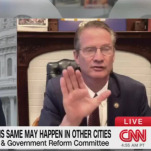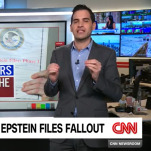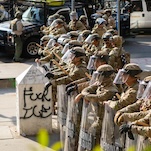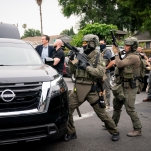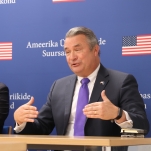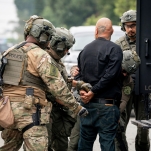Could ISIS infiltrate the U.S. southern border?
President Obama will lay out his strategy to fight the Islamic State extremist group in a prime time speech on Wednesday night. Some Republicans want that plan to address the southern border, which they say could be susceptible to ISIS infiltration.
It’s possible, but not likely, however, that the terrorist group would attempt to enter the U.S. by crossing the border, administration officials and independent experts say.
Francis Taylor, the Department of Homeland Security’s undersecretary for intelligence and analysis, acknowledged on Wednesday that associates of ISIS have discussed the possibility of entering the U.S. illegally from Mexico.
“There have been Twitter, social media exchanges among [ISIS] adherents across the globe speaking about that as a possibility,” Taylor told members of the Senate Homeland Security and Governmental Affairs Committee.
But he said the government has the capacity to stop ISIS operatives from crossing the border, adding that the organization does not present an imminent threat to targets inside the United States.
“I’m satisfied that we have the intelligence and the capability at our border that we could prevent that activity,” he said.
Top Republicans aren’t convinced. Sen. John McCain (R-Ariz.) was incredulous over Taylor’s claim during Wednesday’s hearing.
“There are thousands of people who are coming across our border who are undetected and not identified, and for you to sit there and tell me that we have the capability or now have the proper protections on our southwest border … is a great concern to the citizens of my state,” he said.
Sen. Rand Paul (R-Ky.), a potential 2016 presidential contender, and House Speaker John Boehner (R-Ohio) this week urged Obama to review his border policies to prevent any potential ISIS infiltration.
-

-

-

-

-

-

-

-

-

-

-

-

-

-

-

-

-

-

-

-

-

-

-

-

-

-

-

-

-

-

-

-

-

-

-

-

-

-

-

-

-

-

-

-

-

-

-

-

-

-

-

-

-

-

-

-

-

-

-

-

-

-

-

-

-

-

-

-

-

-

-

-

-

-

-

-

-

-

-

-

-

-

-

-

-

-

-

-

-

-

-

-

-

-

-

-

-

-

-

-

-

-

-

-

-

-

-

-



















































































